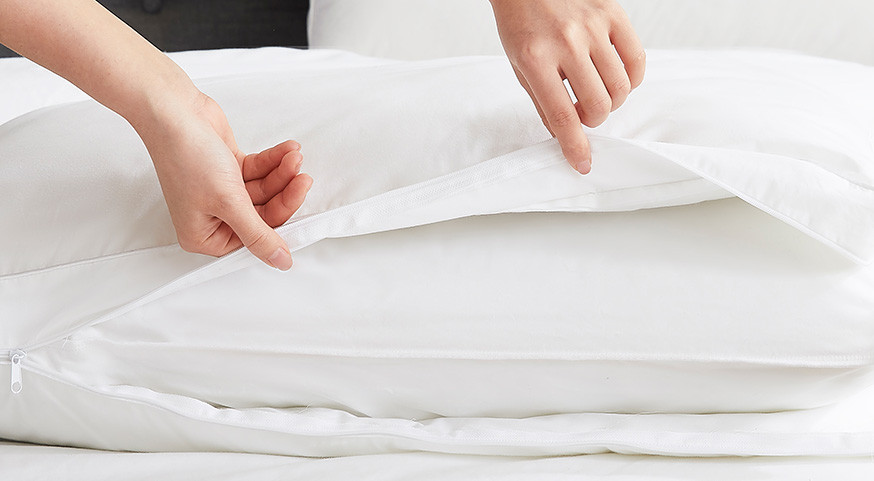Posted by Stefan Hunter on Jan 06, 2025
What Does a Pillow Protector Do? Why You Need One
When it comes to achieving restful sleep, we often focus on selecting the perfect mattress or the softest sheets. However, there's a silent guardian of sleep hygiene that many overlook: the pillow protector. If you've ever wondered, "What does a pillow protector do?" or "Should I use a pillow protector?" you're not alone. This article delves into the purpose of pillow protectors and why incorporating them into your bedding routine is smart.
What Is a Pillow Protector?
A pillow protector is a removable cover that encases your pillow beneath the pillowcase. Typically made from materials like cotton, polyester, or specialized fabrics, it's designed to shield your pillow from various elements that compromise its cleanliness and longevity. Unlike a standard pillowcase, which mainly provides a comfortable surface for your head, a pillow protector serves as a defensive barrier against allergens, moisture, and wear and tear.
The Functions of a Pillow Protector
- Guarding Against Allergens
Pillows can become a breeding ground for dust mites, mold, and other allergens. These microscopic invaders can exacerbate allergies and asthma, leading to restless nights and health issues. A pillow protector acts as a shield, preventing allergens from penetrating the pillow's surface and accumulating inside. This is particularly beneficial for individuals with sensitivities or respiratory conditions.
- Extending Pillow Lifespan
Pillows absorb sweat, oils from your skin, and accidental spills, all of which can degrade their quality. A pillow protector minimizes direct contact between the pillow and these damaging substances by acting as a protective layer. This keeps your pillow cleaner and extends its usable life, saving you money in the long run.
- Moisture Protection
Moisture is the enemy of pillow hygiene. Whether from night sweats or environmental humidity, moisture can lead to mold and unpleasant odors. Some pillow protectors come with waterproof or water-resistant properties, effectively preventing moisture from seeping into the pillow's core.
- Easy Maintenance
Washing a pillow isn't always practical or recommended, as it can alter its shape and comfort. Pillow protectors, however, are usually machine-washable and quick-drying. Regularly washing the protector keeps your sleeping environment clean without the hassle of dealing with the pillow itself. Checkout www.beddingcare.com for tips.
Should You Use a Pillow Protector?
Absolutely. Incorporating a pillow protector into your bedding setup is a simple yet effective way to enhance sleep hygiene and comfort. Here's why you should consider using one:
- Improved Health: Reducing exposure to allergens and preventing mold growth contribute to better respiratory health and overall well-being.
- Cost Efficiency: Protecting your pillow means it will last longer, reducing the frequency of replacements.
- Convenience: Easy to remove and clean, pillow protectors simplify the maintenance of a clean bed.
- Peace of Mind: Knowing your pillow is safeguarded against allergens and spills allows for a more restful sleep.
Choosing the Right Pillow Protector
When selecting a pillow protector, consider the following factors:
Material
For comfort, opt for breathable fabrics like cotton. If moisture protection is a priority, look for protectors with waterproof linings made from materials like polyurethane that don't crinkle or trap heat. Some pillow protectors feature cooling performance fabrics like TENCEL or Modal.
Hypoallergenic Features
For allergy sufferers, hypoallergenic protectors are essential. They are designed to block common allergens effectively.
Size and Fit
Ensuring the correct size of your pillow protector is crucial for both comfort and effectiveness. Pillows come in various sizes, including standard, queen, king, and jumbo (also known as standard/queen). If you have a jumbo pillow and can't find a jumbo protector, don't worry. Jumbo pillows can comfortably fit into either jumbo or queen protectors when a jumbo size isn't available. The slight dimension difference won't affect the protector's performance, and your pillow will still be adequately covered.
Ease of Cleaning
Choose a protector that's machine-washable for hassle-free maintenance. Check the care instructions to ensure longevity.
A Final Word
A pillow protector might seem like an optional bedding accessory, but its benefits are substantial. Protecting against allergens, moisture, and wear enhances sleep quality and extends the life of your pillow. Considering the minimal investment and significant returns in comfort and hygiene, a pillow protector is a wise choice for anyone seeking a better night's sleep.
So, should you use a pillow protector? The evidence points to a resounding yes. It's a small step that makes a big difference, turning your bed into a cleaner, healthier haven of rest.

